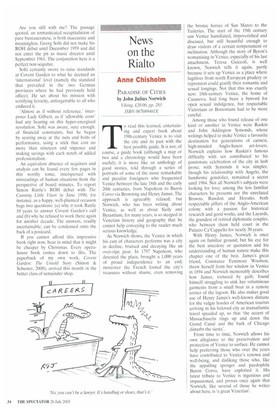News on the Rialto
Anne Chisholm
PARADISE OF CITIES by John Julius Norwich Viking, £20.00, pp. 283 ISBN 06708940IX To read this learned, entertaining and expert book about 19th-century Venice is to visit the city and its past with the best possible guide. It is not, of course, a guide book (although a map or two and a chronology would have been useful); it is more like an anthology of good stories, told through a series of portraits of some of the more remarkable and peculiar foreigners who frequented Venice between the late 18th and the early 20th centuries, from Napoleon to Baron Corvo via Browning and Henry James. The approach is agreeably relaxed; but Norwich, who has been writing about Venice, as well as about Sicily and Byzantium. for many years, is so steeped in Venetian history and geography that he cannot help conveying to the reader much serious knowledge.
As Norwich shows, the Venice in which his cast of characters performs was a city in decline, bruised and decaying like an over-ripe pear. In 1797 Napoleon, who detested the place. brought a 1,000 years of proud independence to an end; moreover the French looted the city's treasures without shame, even removing the bronze horses of San Marco to the Tuileries. The start of the 19th century saw Venice humiliated, impoverished and diseased, but still beautiful enough to draw visitors of a certain temperament or inclination. Although the story of Byron's womanising in Venice, especially of his last attachment. Teresa Guiccoli, is well known, Norwich tells it again, partly because it sets up Venice as a place where fugitives from north European prudery or repression could gratify their romantic and sexual longings. Not that this was exactly new; 18th-century Venice, the home of Casanova, had long been a byword for open sexual indulgence, but respectable Victorians or Bostonians had to be more careful.
Among those who found release of one kind or another in Venice were Ruskin and John Addington Symonds, whose writings helped to make Venice a favourite destination for generations of earnest, high-minded Anglo-Saxon art-lovers. Norwich explains how Ruskin's famous difficulty with sex contributed to his passionate celebration of the city in lush prose; with Symonds it was simpler, though his relationship with Angelo, the handsome gondolier, remained a secret until 1984. Not all Norwich's subjects were looking for love: among the less familiar characters he presents are the unrelated Browns, Rawdon and Horatio, both respectable pillars of the Anglo-American colony with a passion for historical research and good works, and the Layards, the grandest of retired diplomatic couples, who between them held court in the Palazzo Ca'Cappello for nearly 30 years.
With Henry James, Norwich is once again on familiar ground; but his eye for the best anecdote or quotation and his understanding of human nature make this chapter one of the best. James's great friend, Constance Fenimore Woolson, threw herself from her window in Venice in 1894 and Norwich memorably describes how James, tortured by guilt, found himself struggling to sink her voluminous garments from a small boat in a remote corner of the lagoon. He also makes good use of Henry James's well-known distaste for the vulgar hordes of American tourists arriving in his beloved city as transatlantic travel speeded up, so that 'the accent of Massachusetts rings up and down the Grand Canal and the bark of Chicago disturbs the siesta'.
From time to time, Norwich allows his own allegiance to the preservation and protection of Venice to surface. He cannot help preferring those who over the years have contributed to Venice's renown and well-being, and disliking those who, like the appalling sponger and paedophile Baron Corvo, have exploited it. His latest tribute to Venice is ingenious and impassioned, and proves once again that Norwich, like several of those he writes about here. is 'a great Venetian'.


























































 Previous page
Previous page